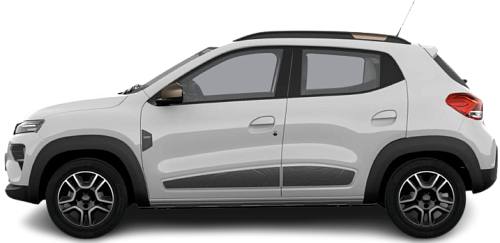USA EV Comparison: Dacia Spring Electric 65 hp vs Renault Twingo Z.E. Base
Struggling to Decide? Let AI Help!
Your AI Summary Is Ready!
General Info
Both vehicles have been discontinued and were never available for sale in the United States.
The two vehicles share the same body style: Hatchback.
| Property | Dacia Spring Electric 65 hp | Renault Twingo Z.E. Base |
|---|---|---|
| Years of Production | 2023-2024 | 2020-2024 |
| Current Status | Discontinued | Discontinued |
| Country of Manufacture | China | Slovenia |
| Body Style | Hatchback | Hatchback |
| Market Availability | EU | EU |
| GCC Score | 4.3 | 5 |
Range and Efficiency
While the Dacia Spring Electric 65 (2023-2024) offers a longer real-world range and a bigger battery, it is less energy-efficient than the Renault Twingo Z.E. (2020-2024).
| Property | Dacia Spring Electric 65 hp | Renault Twingo Z.E. Base |
|---|---|---|
| Range (WLTP) | 137 mi | 118 mi |
| Range (GCC) | 116 mi | 101 mi |
| Battery Capacity (Nominal) | 27.4 kWh | 23 kWh |
| Battery Capacity (Usable) | 26.8 kWh | 21.3 kWh |
| Efficiency per 100 mi | 23.1 kWh/100 mi | 21.1 kWh/100 mi |
| Efficiency per kWh | 4.33 mi/kWh | 4.74 mi/kWh |
| Range and Efficiency Score | 6 | 6.2 |
Charging
Both vehicles utilize a standard 400-volt architecture.
The Renault Twingo Z.E. (2020-2024) has no DC fast charging capability, whereas the Dacia Spring Electric 65 (2023-2024) can charge at up to 30 kW.
The Renault Twingo Z.E. (2020-2024) features a more powerful on-board charger, supporting a maximum AC charging power of 22 kW, whereas the Dacia Spring Electric 65 (2023-2024) is limited to 6.6 kW.
| Property | Dacia Spring Electric 65 hp | Renault Twingo Z.E. Base |
|---|---|---|
| Max Charging Power (AC) | 6.6 kW | 22 kW |
| Max Charging Power (DC) | 30 kW | - Max Charging Power (DC) |
| Architecture | 400 V | 400 V |
| Charge Port | CCS Type 2 | Type 2 (Mennekes) |
| Charging Score | 3.4 | 5.7 |
Performance
The Renault Twingo Z.E. (2020-2024) is rear-wheel drive, while the Dacia Spring Electric 65 (2023-2024) offers a front-wheel drive system.
The Renault Twingo Z.E. (2020-2024) boasts greater motor power and accelerates faster from 0 to 60 mph.
| Property | Dacia Spring Electric 65 hp | Renault Twingo Z.E. Base |
|---|---|---|
| Drive Type | FWD | RWD |
| Motor Type | PMSM | PMSM |
| Motor Power (kW) | 48 kW | 60 kW |
| Motor Power (hp) | 64 hp | 80 hp |
| Motor Torque | 83 lb-ft | 118 lb-ft |
| 0-60 mph | 13.2 s | 12.1 s |
| Top Speed | 78 mph | 84 mph |
| Performance Score | 1.4 | 1.7 |
Dimensions
The Dacia Spring Electric 65 (2023-2024) stretches out longer, while the Renault Twingo Z.E. (2020-2024) compensates with a wider stance. As for height, they’re nearly identical, so headroom should be comparable.
The Renault Twingo Z.E. (2020-2024) boasts a more extended wheelbase.
| Property | Dacia Spring Electric 65 hp | Renault Twingo Z.E. Base |
|---|---|---|
| Length | 147 in | 142.3 in |
| Width (with Mirrors) | 69.7 in | 73.8 in |
| Width (w/o Mirrors) | 62.2 in | 64.8 in |
| Height | 59.7 in | 60.7 in |
| Wheelbase | 95.4 in | 98.1 in |
Cargo and Towing
The Dacia Spring Electric 65 (2023-2024) features a larger trunk, but the Renault Twingo Z.E. (2020-2024) offers greater maximum cargo capacity when the rear seats are folded.
Neither car is equipped with a frunk (front trunk).
Neither vehicle is officially rated for towing in the US.
| Property | Dacia Spring Electric 65 hp | Renault Twingo Z.E. Base |
|---|---|---|
| Number of Seats | 4 | 4 |
| Curb Weight | 2150 lb | 2452 lb |
| Cargo Volume (Trunk) | 10.2 ft3 | 6.6 ft3 |
| Cargo Volume (Max) | 22.3 ft3 | 34.6 ft3 |
| Cargo Volume (Frunk) | - Cargo Volume (Frunk) | - Cargo Volume (Frunk) |
| Towing Capacity | - Towing Capacity | - Towing Capacity |
| Cargo and Towing Score | 3.8 | 3.9 |




